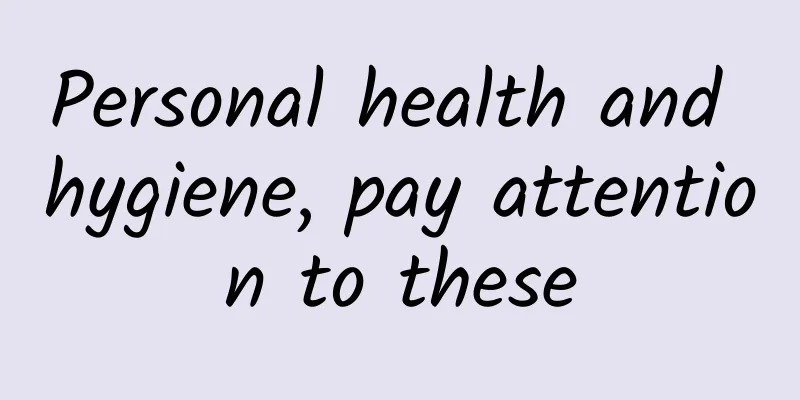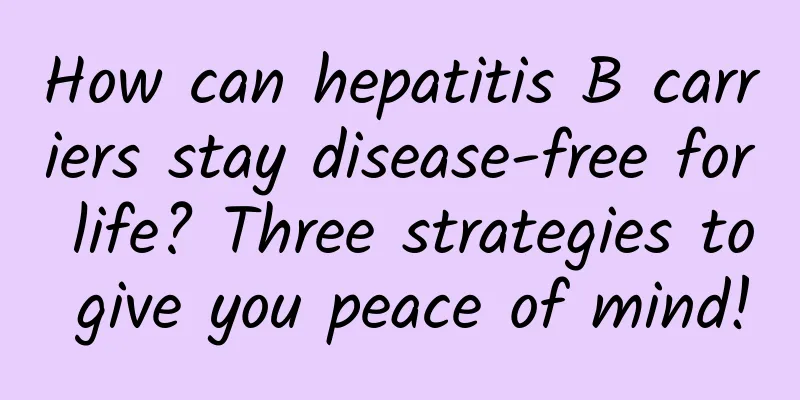Personal health and hygiene, pay attention to these

|
Personal health and hygiene 1. Don’t share these items 1. Do not share earphones and ear picks. Sharing earphones and ear spoons may help spread viruses. Scientific research has found that it can spread common warts, which are what ordinary people call warts. 2. Do not share nail clippers. For example, some people have onychomycosis, which is not so accurate. It can be spread through nail clippers if you don’t pay attention to cleaning. 3. Do not share eyebrow razors and razors. Just think about it, it is very sharp and it is easy to scratch the skin if you are not careful. If the skin is scratched, blood will come out. Blood itself has the function of spreading diseases. For example, some viruses are transmitted through blood and body fluids. The most powerful one is HIV, and of course there are some hepatitis viruses. So when you are shaving, especially with a sharp razor or an eyebrow razor, if it gets broken accidentally, if you just rinse it with clean water, these viruses cannot be killed. If the patient is a carrier of hepatitis virus such as hepatitis C or hepatitis B, and if there are some infectious substances on the razor and eyebrow razor after the wound is broken and you use it, there is a possibility of cross infection or disease transmission. Today we will focus on nail clippers, eyebrow razors and razors. 4. Why shouldn’t we share toothbrushes? 1) First of all, the toilet is a humid environment. If there are some substances or bacteria on the toothbrush, it is very easy for bacteria to multiply. Toothbrushes are used every day. During the brushing process, the toothbrush comes into contact with the teeth and mouth. There are many bacteria and viruses around the teeth in the mouth. If they are not rinsed clean, some bacteria may remain on them. 2) The process of brushing teeth may produce some food residues, plus moisture, water and temperature. If you are not careful, it may be contaminated by some bacteria. 5. Don’t share bath towels 1. The harm of sharing bath towels: After the skin is damaged, some bacteria and viruses can be transmitted, causing rashes or some skin diseases. There may be some health risks, some diseases may be spread, and cross infection may occur. 2. Body cleanliness 1. Where is the dirtiest part of the human body? The first is the oral cavity. There are more than 100 million microorganisms per square centimeter of a person's mouth. The microorganisms live between our teeth and tongue, and produce the unpleasant smell of hydrogen sulfide when they decompose food and saliva. Second scalp. There are about 1 million microorganisms per square centimeter, which mainly absorb substances secreted by sebaceous glands. In severe cases, they can cause hair loss. The third armpit. The crunch pits contain up to 1 billion microorganisms per square centimeter. The sweat will generate a large number of bacteria, thus producing some unpleasant odors. Fourth intestine. There are more than 400 kinds of bacteria living in our intestines for a long time, but most of them are neutral bacteria and beneficial bacteria that help our gastrointestinal digestion. 2. Can the belly button be cleaned? 1) Many people say that the belly button should not be touched. This is influenced by traditional concepts, but it is actually unscientific. 2) How to clean your belly button? Remember not to pick it with your hands. Use a cotton swab dipped in some lubricant to clean your belly button. 3. The dangers of having long nails 1) Harm 1: Scratching with long nails It is easy to scratch your skin, and the bacteria and viruses in the nail crevices will take the opportunity to enter the wound and cause infection and suppuration. If you have poor resistance, it may even cause sepsis and endanger your life. 2) Harm 2: Picking teeth with long fingernails Not only will it send bacteria and parasite eggs directly into your mouth to spread various diseases, but it will also increase the distance between teeth, making it easy for teeth to become loose over time. If the gums bleed during the process of picking your teeth, it will cause a bigger problem. 3) Harm three: using long fingernails to pick your ears Molds are often brought into the ear canal, causing otitis media. Some inflammations may even enter the brain and cause meningitis. 4) Harm 4: Picking your nose with long fingernails It is very easy to bring in dirt, causing inflammation of the nasal passages, infection and even chronic diseases, which will eventually affect your sense of smell. 5) Of course, I would like to remind you again not to cut your nails in public places, such as on an airplane, on the subway, on the high-speed train, during meetings, or in class. 4. Teach everyone how to wash hands correctly Wash your hands with the 7-step method of holding your wrists upright with a bow inside and outside. 1. Inside: Rub both palms together with hand sanitizer 2. Outside: Use the palms and backs of your hands to rub 3. Clip: Cross your hands and rub them together. 4. Bow: It's your hand that's bent like this, both hands are the same 5. Large: It's the thumb. Rub your hand with your thumb. 6. Stand: Knead with your fingertips raised 7. Wrist: Wash your forearms with water and keep doing this for more than 20 seconds. 5. Is hand sanitizer useful? 1. First of all, is hand sanitizer useful? Generally, it contains 75% alcohol, which can effectively kill viruses, but it is still inferior to washing hands thoroughly. 2. How does hand sanitizer compare to hand washing? Don't be lazy, if you can wash your hands, use the 7-step hand washing method. If you really can't, you can use hand sanitizer. But you still have to wash your hands seriously when you get home. 3. Personal health habits 1. Don’t cover your mouth with your hands when you sneeze. 1) Do not cover your mouth with your hands when you sneeze. Sneezing will produce some droplets. Covering your mouth and nose with your hands can easily infect you with pathogens in the environment and spread them to other people. 2) What should I do if I don’t have time to take out tissue or handkerchief? We can use our elbows to block the droplets so that they don't get everywhere and our hands don't get covered with droplets. 2. Is it harmful to the body to swallow phlegm? 1) Causes of sputum production: Its main component is exudates from the blood, and it often carries some adsorbed bacteria, viruses or dust particles. When we are infected by pathogenic microorganisms, we will have an upper respiratory tract infection and cough up phlegm. 2) Analysis of sputum: There are various bacteria in sputum, such as Gram-positive bacteria, Gram-negative bacteria, and fungi, etc. Gastric acid cannot eliminate these three types of bacteria 100%. Therefore, for some people with weak gastrointestinal function, swallowing sputum may cause intestinal diseases and even the risk of infection. 3) What should you do in normal times? Everyone should prepare more paper at ordinary times. When you have phlegm, don't swallow it often. Spit it on paper and throw it into the appropriate trash. 3. Do you have these two bad habits? 1) Two bad habits: 1. Spitting 2. Blow your nose randomly Now is the peak influenza season and a special epidemic period. These bad habits may seem to be very minor problems, but they may spread some viruses or even some bad pneumonia. 2) What should you do in normal times? Take good self-protection and wear a mask. Do not spit or blow your nose casually. If you really need to do this urgently, bring some tissues with you. If you really need to cough up phlegm, wrap it in paper and throw it in the appropriate trash can to sort the garbage. 4. Don’t have these three bad habits in life The first is to not put our food on a blank sheet of paper. There are a lot of residues and even some dyes on white paper. If you put them on the paper, they will contaminate our food and we will get sick from the food we eat. Second, do not use plastic bags to pack overheated food. Plastic bags actually contain a lot of plastics, and another plastic bag may produce toxic substances after being heated. Third, don’t use toilet paper to wipe dishes casually. The hygiene and craftsmanship of toilet paper are actually quite low, because toilet paper is used to wipe the buttocks. How can you use the toilet paper for wiping buttocks to wipe the tableware casually? It seems clean, but in fact there are many health risks. 5. Five places in life where bacteria are likely to grow 1) Bacteria from razors. The number of bacteria on a razor is 1.2 million per square centimeter, which is 125 times dirtier than a toilet seat. 2) Bacteria in masks that are often worn The number of bacteria is 300,000 per square centimeter, so masks must be replaced regularly. 3) Bacteria on the third toothbrush The number of bacteria is 250,000 per square centimeter. 4) Bacteria on the fourth pillowcase Expose the pillow core to the sun regularly, otherwise it will contain a lot of bacteria. 5) Fifth Computer Keyboard Bacteria A hotbed for bacteria to breed, wipe and disinfect regularly 6. How to disinfect your mobile phone? 1) After returning home, be sure to disinfect your phone. After washing your hands, you can wipe the surface of the phone with a tissue containing 75% alcohol and then throw the tissue into the trash can. This will disinfect the phone screen. 2) Quaternary ammonium salts can also be used for disinfection You can spray it on your phone, then wipe it clean with clean paper and leave it there to dry. It will not damage the phone and is effective in killing viruses. 7. Six bad habits when going to the bathroom 1) First, wash your hands before and after going to the toilet. Many people wash their hands after going to the toilet, but washing hands before going to the toilet is also very important. 2) Second, take a small step forward, especially boys. 3) Be sure to flush the toilet immediately after using it. 4) When using the toilet in public places, try to carry a disposable toilet mat with you. Some high-end toilets also have disposable toilet mats. 5) Fifth, the toilet in the house must be cleaned every day. 6) Clean the bathroom promptly after taking a shower. For example, some hair in the floor drain or washbasin should be cleaned in time. When cleaning the bathroom, don't just focus on the surface, but also pay attention to some sanitary dead corners and some details. The bathroom should always be kept ventilated and dry. |
<<: Data Analysis: How Smartphones and Mobile Apps Have Changed the World
>>: Data Analysis: Global Online Consumers and Multi-Screen Media – Infographic
Recommend
Sometimes uterine cramps
Sometimes the uterus will twitch and feel pain. T...
Bleeding after sex with husband
Normal couples should have appropriate sexual int...
Is the oil on the condom harmful to the body? 8 truths about condoms that you bet you didn't know!
...
Can I eat pickled pepper chicken feet during menstruation?
Menstruation is also known as monthly affairs, mo...
Is gynecological inflammation related to regional climate?
Gynecological inflammation is a common disease ma...
What are the reactions after taking emergency contraceptive pills?
In life, being with the one you love is a very ha...
Can I have sex with a condom during my period?
The menstrual period is a period when women's...
The five most suitable health teas for women
It is a well-known fact that everyone loves beaut...
Did you have a dull stomach ache before pregnancy?
A series of abnormal symptoms will appear after p...
How many eggs should a pregnant woman eat a day?
The nutritional value of eggs is generally recogn...
What happens if dysmenorrhea is severe?
Dysmenorrhea is an increasingly common problem. F...
I am so young, I shouldn’t get cervical cancer! So should I still get the HPV vaccine?
Cervical cancer is a cancer that occurs in the fe...
What is the best medicine for women with irregular menstruation?
Most female friends have experienced irregular me...









